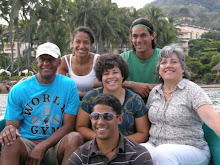We are all fundamentally the same. Neighborhood to neighborhood kids enjoy the same play; The fresh lemon juice dripping from the Dona’s hands; The nurse’s compassionate care through the simple application of a band aid on a light scrape; Sweating in the Caribbean sun; Crying with sadness. If most humans share many of these same sentiments why did I feel the least bit cautious and unsure when I signed up to volunteer at a summer camp that brought me closer to AIDS and Cholera than perhaps I will ever again be in my life. I was entering the common ground of counseling and playing with youth; but youth that carried a disease and hardship that I had learned had killed some 25 million people. How would I shed my fear, ignorance, and preconceptions of these bright, hopeful, joyous, and HIV infected young kids?
Growing up as a kid I believed those dropping starving faces and unpleasant living conditions broadcasted on television were naturally part of a HIV/AIDS lifestyle. I felt that Magic Johnson would never be recognized as good a b-ball player as Michael Jordan because he was “infected.” “Campamento Alegria and Esperanza” in Jarabacoa introduced me to 80 Dominican kids who helped me to break this stigmatization of someone “infected.” These youth did not deserve to be classified as weak, suffering, struggling, helpless, incapable, lost, poor, or any degrading term that does not build self esteem. They all live with the challenge of taking extra care of themselves because their immune systems may not be fully prepared to fight off “un chin de gripe,” the same way a super studded campesino can tolerate rain, dust, mosquitoes, and a jumbo President morning and night.
I tried to make basic comparisons that would help me connect to their reality. Just as a youth of the suburban San Francisco Bay Area I am accustomed to brushing my teeth morning and night; so too have the Orphans of La Romana grown up taking pills twice a day to manage HIV/AIDS. But that’s not a fair comparison to male because they too brush their teeth morning and night. Just as I have lived without seeing my parents for a year, so to do many of these kids go home to a shelter where they have never know a real mom or dad. Neither is this comparison fair because my mom and dad are jetting down to the Caribbean to visit me in a month. So how would I step into the shoes and connect with these kids fighting a courageous fight?
David Castillo was deaf and infected with HIV. This did that stop him from celebrating with the rest of his friendly campers. He depicted a colorful Dominican countryside with markers, danced “Dem-Bow” in front of a crowded dinning room at the talent show, and even read children’s books out loud better than most his peers. Hector was from a violent household and his bed time shenanigans of slipping around to different bunk beds and tickling other camper’s ears kept me up an extra thirty minutes ever night, but during the quite rest hour his puzzle solving ability was unmatched. I wanted to define these kids by their strengths, rather than by their weaknesses. These young kids had the chance to take complete advantage of a freeing summer camp that chose not to focus on the baggage that we as a society often place on someone “HIV Positive.”
The sum of good work (not rest and relaxation at a Barceló resort or betting on a cock fight) is what builds a Peace Corps Volunteer’s “Close of Service” statement and resume. The reality of living with HIV/AIDS is far closer to a youthful Dominican lifestyle of going to school, eating the “bandera” at 12 noon, and playing baseball in the afternoon, than it is to the ugly depictions on TV advertisements soliciting funding for the poor and dying children of the world. Humanity needs to hold our fellow citizens of the developing world to a higher standard. They are not dying. I saw them in exuberant action at summer camp in the Dominican Republic where the population infected by HIV/AIDS is below 1%. My mission now is to spread this good news to my family and friends in the developed world who may think of themselves as living a vastly different life, when really the common ground is much greater than the uncommon, because we are all fundamentally the same.
Get to know someone you don't think highly of and then go further and find reason to appreciate them,
Jared
Thursday, August 25, 2011
Subscribe to:
Comments (Atom)
